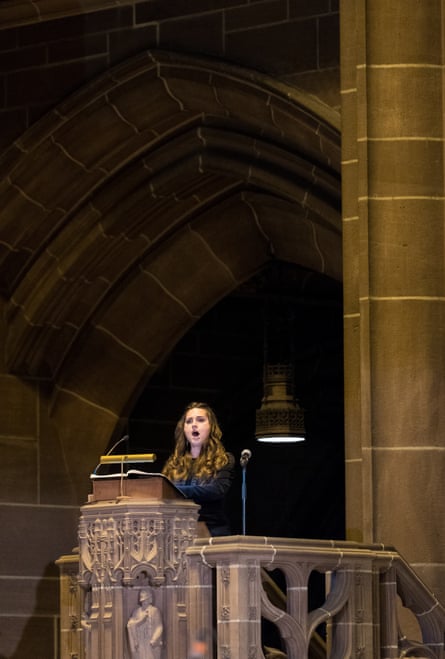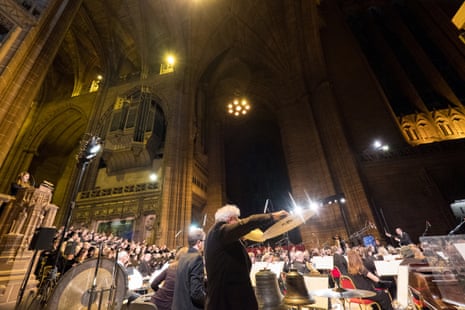Growing up across the Mersey in Birkenhead, Wilfred Owen never lived to see Liverpool’s massive Anglican cathedral rise up on the skyline. He was a schoolboy when Edward VII laid the foundation stone in July 1904. Perhaps Owen was among the children lining the railings to see the king on that hopeful summer’s day, as reported in the Liverpool Echo. He was killed in action in November 1918.
This gave special poignancy to the Royal Liverpool Philharmonic Orchestra and Choir’s Armistice centenary performance in that building last week of Britten’s War Requiem (1962) – written for the consecration of another cathedral, Coventry – which sets poems by Owen within the Latin mass for the dead. Yet more affecting, and acutely of the here and now, was the involvement of several players from Hanover’s NDR Radiophilharmonie.
The factor uniting these once hostile cities, beyond the many symbolic or historical parallels you might draw, is the figure of Andrew Manze, principal conductor of the NDR Orchestra, and principal guest conductor of the RLPO. He led the same joint forces in Hanover, a week ahead of the Liverpool performance. Soloists were drawn from both nations: the German soprano Susanne Bernhard and baritone Benjamin Appl; the British tenor Ed Lyon. The boys of the Hannover Knabenchor sang alongside choristers of Liverpool cathedral, hidden high in the Dulverton bridge, which spans the cathedral.

Those in the capacity audience sitting anywhere farther back than the front of the nave must have had a somewhat hazy but decidedly powerful experience. The 300 performers, boys aside, were seated under the soaring transept. Sound swirled up into the vaulting heights and came back to greet itself after several seconds’ delay, as chamber orchestra, main orchestra including large percussion section and a throng of fanfaring brass did their utmost to match Manze’s precise, authoritative beat.
This lack of exactitude – acoustical, not musical; singers and chorus were impressively drilled – added to the extraordinary atmosphere. Lyon was clear and expressive in the work’s first solo, “What passing bells”, Britten’s light scoring never obscuring his diction. Appl had more problems, partly because of the lower-lying range. He often sounded out of sorts, but found ideal serenity, with Lyon, in the redemptive “Let us sleep now…” Bernhard, placed in the pulpit, fared well, especially in the tug and throb of the Lacrimosa, hushed chorus adding its interjections to the soprano lament. Near the end, trebles alone sing “Requiem aeternam”, young voices united in ethereal music. As Stefan Schostok, the mayor of Hanover, wrote in the programme, even if political links between our countries “look set to be severed”, culture connects. The long silence, hanging heavy in the air at the end, roared agreement. This work may be flawed, but its ability to communicate is masterly.
Both Liverpool and Hanover are Unesco cities of music, a point underlined at the War Requiem. I admit I’d taken it rather for granted as I set off for Bath, a Unesco world heritage site. The annual Mozartfest, which exists without public funding, is the creation of Amelia Freedman, for half a century a one-woman powerhouse of imaginative programming (she also runs the Nash Ensemble). Mozart is the wellspring, rather than the limit. On Monday the Takács Quartet, now happily settled with their new second violinist, Harumi Rhodes, combined Mozart with Brahms and Shostakovich. The Assembly Rooms have a tricky, dry acoustic, which in fact suited the Shostakovich. His Quartet No 4 in D major is subtle, private, elusive. The Takács brilliantly presented the harmonic arguments as if working through the full spectrum of monochrome in sound, dusky to luminous, black to white.
On Tuesday in the Guildhall, the French-born, Dresden-based oboist Céline Moinet, Norwegian violinist Henning Kraggerud and two British musicians, viola player Lawrence Power and cellist Adrian Brendel, gave a lithe account of Mozart’s buoyant oboe quartet K370. Then the terrific Moinet demonstrated the instrument’s rich range in four of Britten’s Six Metamorphoses After Ovid.
To conclude, the string players made virtuosic light of Mozart’s mighty six-movement Divertimento in E flat, K563. Each instrument pulls with equal weight, debating, joking, with serious, joyful intent: Kraggerud and Power, almost rising from their chairs to achieve a particular phrase, Brendel responding with elegance and panache. A pleasure of this festival is that top international players can form temporary alliances, widening everyone’s horizons. Such easy exchange now looks fragile. Musicians cannot be stockpiled.
On the train back, amid Brexit news and talk of a European army, I read that the international development secretary Penny Mordaunt wants Britain to pull out of Unesco (“Building peace in the minds of men and women”). One commentator called the proposal “historical and cultural vandalism”. Glorious concerts in the far north or gentle south of the UK might sound remote from the concerns of Westminster. In a complicated week they felt, in specific and potent respects, close to the epicentre.
Star ratings (out of 5)
War Requiem ★★★★
Mozartfest ★★★★

Comments (…)
Sign in or create your Guardian account to join the discussion